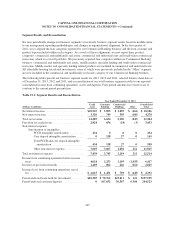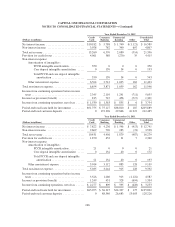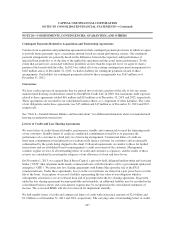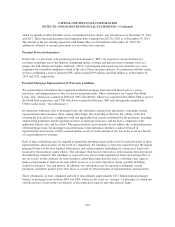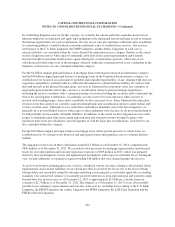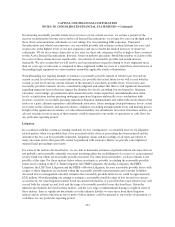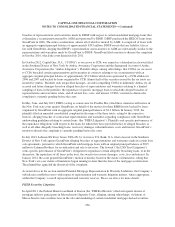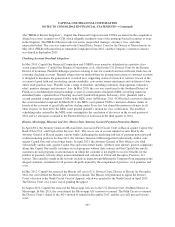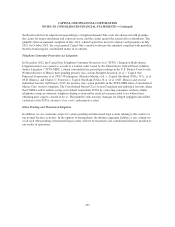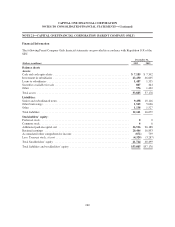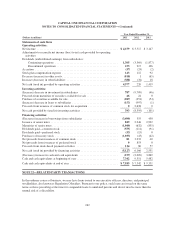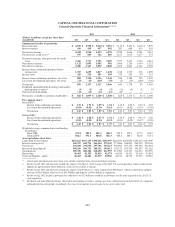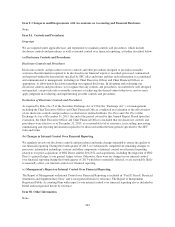Capital One 2013 Annual Report Download - page 274
Download and view the complete annual report
Please find page 274 of the 2013 Capital One annual report below. You can navigate through the pages in the report by either clicking on the pages listed below, or by using the keyword search tool below to find specific information within the annual report.CAPITAL ONE FINANCIAL CORPORATION
NOTES TO CONSOLIDATED FINANCIAL STATEMENTS—(Continued)
Interchange Litigation
In 2005, a number of entities, each purporting to represent a class of retail merchants, filed antitrust lawsuits (the
“Interchange Lawsuits”) against MasterCard and Visa and several member banks, including our subsidiaries and
us, alleging among other things, that the defendants conspired to fix the level of interchange fees. The complaints
seek injunctive relief and civil monetary damages, which could be trebled. Separately, a number of large
merchants have asserted similar claims against Visa and MasterCard only. In October 2005, the class and
merchant Interchange Lawsuits were consolidated before the U.S. District Court for the Eastern District of New
York for certain purposes, including discovery. In July 2012, the parties executed and filed with the court a
Memorandum of Understanding agreeing to resolve the litigation on certain terms set forth in a settlement
agreement attached to the Memorandum. The class settlement provides for, among other things, (i) payments by
defendants to the class and individual plaintiffs totaling approximately $6.6 billion; (ii) a distribution to the class
merchants of an amount equal to 10 basis points of certain interchange transactions for a period of eight months;
and (iii) modifications to certain Visa and MasterCard rules regarding point of sale practices. This agreement is
contingent on final court approval of the class settlement. In November 2012, the court granted preliminary
approval of the class settlement. In December 2013, the court granted final approval of the proposed class
settlement, which was appealed to the Second Circuit Court of Appeals in January 2014. Several merchant
plaintiffs have also opted out of the class settlement, some of which have sued MasterCard, Visa and various
member banks, including Capital One (collectively “the Opt-Out Plaintiffs”). Relatedly, in December 2013,
individual consumer plaintiffs also filed a proposed national class action against a number of banks, including
Capital One, alleging that because the banks conspired to fix interchange fees, consumers were forced to pay
more for the fees than appropriate. These cases are in their preliminary stages.
As members of Visa, our subsidiary banks have indemnification obligations to Visa with respect to final
judgments and settlements, including the Interchange Lawsuits. In the first quarter of 2008, Visa completed an
IPO of its stock. With IPO proceeds, Visa established an escrow account for the benefit of member banks to fund
certain litigation settlements and claims, including the Interchange Lawsuits. As a result, in the first quarter of
2008, we reduced our Visa-related indemnification liabilities of $91 million recorded in other liabilities with a
corresponding reduction of other non-interest expense. We made an election in accordance with the accounting
guidance for fair value option for financial assets and liabilities on the indemnification guarantee to Visa, and the
fair value of the guarantee at December 31, 2013 and 2012 was zero. Separately, in January 2011, we entered
into a MasterCard Settlement and Judgment Sharing Agreement, along with other defendant banks, which
apportions between MasterCard and its member banks the costs and liabilities of any judgment or settlement
arising from the Interchange Lawsuits.
In March 2011, a furniture store owner named Mary Watson filed a proposed class action in the Supreme Court
of British Columbia against Visa, MasterCard, and several banks, including Capital One (the “Watson
Litigation”). The lawsuit asserts, among other things, that the defendants conspired to fix the merchant discount
fees that merchants pay on credit card transactions in violation of Section 45 of the Competition Act and seeks
unspecified damages and injunctive relief. In addition, Capital One has been named as a defendant in similar
proposed class action claims filed in other jurisdictions in Canada. The Court heard oral argument on plaintiffs’
motion for class certification in the Watson Litigation in April, 2013, and the parties await a ruling.
Late Fees Litigation
In 2007, a number of individual plaintiffs, each purporting to represent a class of cardholders, filed antitrust
lawsuits in the U.S. District Court for the Northern District of California against several issuing banks, including
COBNA. These lawsuits allege, among other things, that the defendants conspired to fix the level of late fees and
over-limit fees charged to cardholders, and that these fees are excessive. In May 2007, the cases were
254



